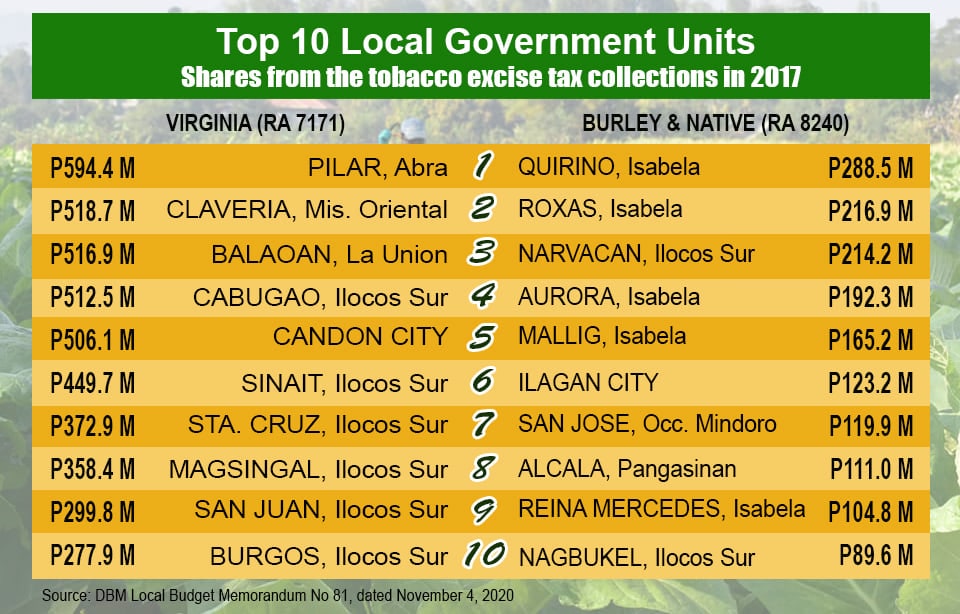by Neyo E. Valdez
The municipality of Pilar in Abra gets P594.4 million share in tobacco excise tax, biggest among beneficiary local government units, based on the latest release on the government tobacco excise tax collections by the Department of Budget and Management (DBM).
The share of the fifth-class municipality is about 39% more than its share from the excise tax from Virginia-type cigarettes in 2016.
Pilar outranked Candon City, the perennial topnotcher in tobacco production, and five other municipalities of Ilocos Sur (Cabugao, Sinait, Sta. Cruz, Magsingal, and Burgos) in the annual release. Claveria in Misamis Oriental and Balaoan in La Union get the next highest share, with P518.69 million and P516.87 milllion, respectively.
Meanwhile, two municipalities in Isabela get the biggest shares from excise tax collections on locally grown Burley and Native type tobacco: Quirino, with P288.5 million and Roxas, P216.9 million.
The shares of LGUs from the collection of tobacco excise tax on locally manufactured Virginia-type cigarettes, and burley and native tobacco in 2017 are based on Local Budget Memorandum 81, issued by DBM on November 4, which provides the guidelines on its release and utilization by the LGUs.
The DBM said the funds shall be chargeable against the 2019 General Appropriations Act.
Tobacco-producing LGUs will receive a total of P18 billion as their share from the government’s tobacco excise tax collections in 2017.
The five provinces producing Virginia-type cigarettes – Abra, Ilocos Norte, Ilocos Sur, La Union and Misamis Oriental – are entitled to a share of P14.4 billion. Meanwhile, 14 provinces that supply barley and native tobacco will get P3.61 billion. These are Abra, Kalinga, Ilocos Norte, Ilocos Sur, La Union, Pangasinan, Cagayan, Isabela, Nueva Vizcaya, Tarlac, Occidental Mindoro, Misamis Oriental, Maguindanao and North Cotabato.
Under Republic Act 7171, LGUs producing Virginia-type cigarettes are entitled to a 15 percent share of national tax collections. Of this amount, 30 percent will be divided among the beneficiary provinces, 40 percent among component cities and municipalities, and 30 percent to the component cities and municipalities.
Republic Act 8240, on the other hand, provides that LGUs producing barley and native tobacco will also receive 15 percent from excise tax collections, of which 10 percent will go to beneficiary provinces and 90 percent to the component cities and municipalities. Per DBM guidelines, the funds are earmarked for the promotion of self-reliance by tobacco farmers through cooperative projects; livelihood projects focusing on developing alternative farming systems; post-harvest and secondary processing facilities; and infrastructure projects such as farm-to-market roads.

